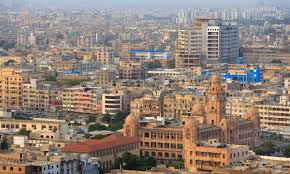By Dr. Saeed Ahmed Ali
There were times when hundreds of thousands of domestic and foreign tourists thronged to Karachi to enjoy the cosmopolitan culture and night life in the only port city of Pakistan. Due to its lively nature, the city was generally called ‘Uroos ul Balad’ (bride of cities) and ‘Roshniyon Ka Sheher,’ (the city of lights).
But over the years, the unending ethno-linguistic strige and negligence on the part of successive governments left it laggard in almost every field of lief. Be it solid waste management or transport city , Karachi has been outpaced by other cities especially Lahore.
No doubt, it is still commercial magnet of opportunity and employment, great tourist attraction hub, the hub of banking, financial and corporate activity, stock exchange, gold bullion.
But the poor governance has turned its local government so weak that it can not manage around 13,000 tonnes of solid waste generated by almost 20 million population daily, resulting in heaps of garbage everywhere in every nook and corner of city.
To ensure solid waste dumping at proper places and landfill sites, the local government has been working on a World Bank funded project, but due to poor implementation, the results have not been on the ground so far.
Similarly, unrestrained housing and encroachments on the banks of water nullahs and natural waterways are a big reason for clogging of drains.
The Sindh Katchi Abadi Authority estimates the majority of the more than 5,000 slums in Karachi are built alongside drains such as Gujjar Nullah.
Recent heavy rains have wreaked havoc in the cosmopolitan city, Karachi. the most thickly populated city of Pakistan, by unleashing urban flooding and inundating neighborhoods and streets.
According to Karachi Municipal Corporation Record, the city experienced the worst devastating torrential rains during the past 100 years, killing at least 41 people.
National Disaster Management Agency (NDMA) says that urban flooding has completely inundated several neighborhoods, adding that hundreds of thousands of people were still trapped in receded flood water mud, due to waterlogging in low-lying slums.
Residents of these localities had been without electricity and mobile phone connections for hours, they said. In March 2019, PM Imran Khan announced a Rs.162 billion package for Karachi city.
Likewise on August 30, 2020, Prime Minister Imran Khan vowed to solve the mega city’s problems.
On August 31, 2020 the Prime Minister Imran Khan ordered the concerned departments to finalise ‘Karachi Transformation Plan’ within a week.
Prime Minister Imran Khan on Saturday (September 5) unveiled an unprecedented and historic financial package worth Rs1.1 trillion for Karachi’s transformation that he said would address the chronic municipal and infrastructure issues of the country’s financial hub.
The prime minister at a press conference during his recent visit to the city had said that the plan would be implemented through the Provincial Coordination Implementation Committee (PCIC) working under the Sindh chief minister.
All stakeholders will be involved in its implementation, “The army will play a big role,” the PM added, observing that the army helps the civilian administration whenever there are floods or a calamity. “The package we have brought for Karachi is historic,” Prime Minister Imran Khan said.
The plan included water supply, encroachments on nullahs, sewerage system and solid waste disposal problems to be solved on a priority basis .
“We will make a proper system,” Prime Minister Imran said. Federation of Pakistan Chamber of Commerce and Industries (FPCCI) president Mian Anjum Nisar has said that ‘Karachi Transformation Plan’ was a commendable vision of the premier, which was people-friendly, adding the dynamic leadership of prime minister Imran Khan and through his Riasat-e-Madina vision, he would steer the country out of the economic gloom.
He said that it was for the first time in the history of Karachi that such a massive plan was being initiated which would be providing relief to the desperate strata of the mega city. Situation of Karachi after torrential rains was critical and it had exposed the performance of the past governments, he said, adding that no government in the past had paid attention to the development of the city as was required.
To a query he said that the Prime Minister had announced a massive package for Sindh in the crucial time.
It should be ensured that each penny would be utilized on improving the infrastructure of Karachi, he emphasized.
Central Leader of Pakistan Tehrik-e-Insaf Nazar Muhammad Gondal said that after accomplishment of the plan the betterment would be coming out of the hard times that Karachi’s people had been facing for the last many decades.
He said that helping the destitute or needy segments of society was a priority agenda of the PTI government and Karachi Transformation Plan was a clear evidence that Prime Minister Imran Khan was working day and night for the uplift and welfare of the general public.
Nazar Muhammad Gondal while giving the details of the premier’s Karachi package said that an amount of Rs 92bn would be spent on water supply projects, Rs 267bn on solid waste management, storm water drains clearance, Rs 141bn on sewage treatment, Rs 41bn for roads while Rs 572bn for mass transit, rail and road transport has been included.
(The writer is working with Associated Press of Pakistan (APP), the official news agency)














